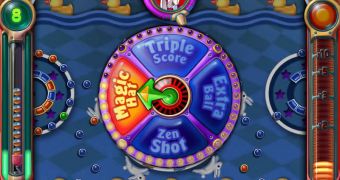East Carolina University's Department of Recreation and Leisure Studies has recently announced the findings of a study aimed at measuring the impact playing casual games has on the individual. The results should be taken with a pinch of salt as the study itself was funded by the most successful of casual publishers, which is PopCap.
The study was six months long and used a "randomized" and "controlled" group of people as test subjects, with three PopCap games, Peggle, Bookworm Adventures and Bejeweled 2, serving as the casual games studied. The results show that playing these games had a clear effect of relieving stress and causing a vast improvement in the mood of the subjects.
It seems that Bejeweled 2 was the best stress reducer from amongst the three games, with a group wide reduction of 54% in stress levels when they played the game, while Peggle was best at enhancing the mood of the subjects. Dr. Carmen Russoniello, who was the director of the study, claimed that the results were "not surprising... given the game's over-the-top celebration of players' success each time they complete a level". In other words, players of the games showed an improvement in overall feeling and a stress reduction because casual games offer instant gratification with very little effort, while creating the illusion of challenge. It's easy enough to go through a Peggle level to make the player fell like he has accomplished something and the game never gets hard enough to be frustrating.
Apparently, depression can also be reduced through casual games, Peggle again being best, with a 45% reduction in depression levels for those that played the game. Fatigue is also affected by casual games, because they activate our brains and senses and give the player a boost that's similar in effect with a cup of coffee.
Dr. Russoniello concluded: "The results of this study are impressive and intriguing, given the extent of the effects of the games on subjects' stress levels and overall mood. When coupled with the very high degree of confidence we have in those results based on the methodology and technologies used, I believe there is a wide range of therapeutic applications of casual games in mood-related disorders such as depression and in stress-related disorders including diabetes and cardiovascular disease".
It might not be the cure for cancer, but maybe the people at East Carolina University's Department of Recreation and Leisure Studies are on to something. Played in short stints, casual games have the potential to be used as "brain activators", providing a well needed break from repetitive tasks and maybe even letting players boost their self esteem and their stamina.

 14 DAY TRIAL //
14 DAY TRIAL //